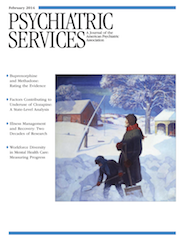Advancing the Recovery Orientation of Hospital Care Through Staff Engagement With Former Clients of Inpatient Units
Abstract
Objectives
This study was undertaken to assess the impact of consumer narratives on the recovery orientation and job satisfaction of service providers on inpatient wards that focus on the treatment of schizophrenia. It was developed to address the paucity of literature and service development tools that address advancing the recovery model of care in inpatient contexts.
Methods
A mixed-methods design was used. Six inpatient units in a large urban psychiatric facility were paired on the basis of characteristic length of stay, and one unit from each pair was assigned to the intervention. The intervention was a series of talks (N=58) to inpatient staff by 12 former patients; the talks were provided approximately biweekly between May 2011 and May 2012. Self-report measures completed by staff before and after the intervention assessed knowledge and attitudes regarding the recovery model, the delivery of recovery-oriented care at a unit level, and job satisfaction. In addition, focus groups for unit staff and individual interviews with the speakers were conducted after the speaker series had ended.
Results
The hypothesis that the speaker series would have an impact on the attitudes and knowledge of staff with respect to the recovery model was supported. This finding was evident from both quantitative and qualitative data. No impact was observed for recovery orientation of care at the unit level or for job satisfaction.
Conclusions
Although this engagement strategy demonstrated an impact, more substantial change in inpatient practices likely requires a broader set of strategies that address skill levels and accountability.



